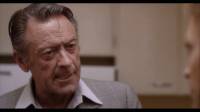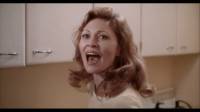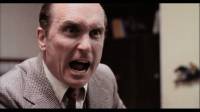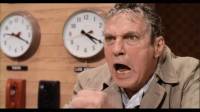Network (Sidney Lumet, 1976)
There is a school of thought that places Network, the 1976 collaboration between writer Paddy Chayefsky and director Sidney Lumet, as the pinnacle of Hollywood media satires. The film is a blistering attack on the culture of television, scathing in its indictment of both the people who make it and the wider population who lap it up uncritically. As Greg Ng put it at Senses of Cinema:*
Lumet’s direction and Paddy Chayefsky’s script lambaste the ills of the modern world (couched within the fast-paced soliloquies delivered by the stellar cast of Peter Finch, Faye Dunaway, Robert Duvall and William Holden) and are oft times prescient, predicting the rise of ‘reality television’, and the subsequent decline of both production and social values… Chayefsky’s script is simply much more ambitious, and verbose, than anything Hollywood offers up for contention these days.
Certainly it is difficult to come up with a recent film quite as bitter and vitriolic: the film’s setup only hints at the bleakness of its vision. It centres on the fallout from the on-air declaration by network anchor Howard Beale (Peter Finch) that he will kill himself on air in a week. At first he is pulled off air, but the network quickly realises it has a ratings bonanza on its hands and reinstates him. Beale becomes a broadcasting phenomenon, even as he becomes increasingly deranged. Meanwhile, his fellow veteran broadcaster Max Schumacher (William Holden) embarks on an affair with Diana Christensen (Faye Dunaway), the ambitious executive who thinks she can rise to the top by appealing to the lowest common denominator.
The film is the product of two veterans of television: both Lumet and Chayefsky started their careers in the live television dramas of the fifties. (Lumet’s first feature, 12 Angry Men, was an adaptation of one of these, while Chayefsky had won an Oscar for reworking his own television script as the feature Marty). The film’s most famous lines are the on-air rants delivered by Beale, and they embody much of Chayefsky’s disillusionment with the direction the medium was taking. Take this speech, for example, shouted by Beale at the cameras and a darkened, faceless studio audience:
Because less than three per cent of you people read books. Because less than fifteen percent of you read newspapers. Because the only truth you know is what you get over this tube. Right now, there is a whole, an entire generation that never knew anything that didn’t come out of this tube. This tube is the gospel, the ultimate revelation; this tube can make or break presidents, popes, prime ministers; this tube is the most awesome goddamn force in the whole godless world, and woe is us if it ever falls into the hands of the wrong people, and that’s why woe is us that Edward George Ruddy died. Because this company is now in the hands of CCA, the Communications Corporation of America; there’s a new chairman of the board, a man called Frank Hackett, sitting in Mr. Ruddy’s office on the twentieth floor. And when the 12th largest company in the world controls the most awesome goddamn propaganda force in the whole godless world, who knows what shit will be peddled for truth on this network?
The disillusionment here seems to be a genuine channelling of Chayefsky’s views, which is the film’s central paradox. Beale is a madman, and the network’s showcasing of him is meant to be the ultimate abandonment of responsible newscasting. Yet Chayefsky nevertheless seems to want us to take what he says on face value. So if Beale is telling it how it is, why are we supposed to believe that the “Howard Beale Show” is such a travesty?
The film is rich in such contradictions. It’s part of the attraction, because its ambiguity of meaning leaves a lot to be argued about, including the core question of whether Chayefksy is brilliantly ambiguous or just hopelessly confused. The double-edged presentation extends to the way the film is made. The film starts as a realistic newsroom drama and becomes increasingly over-the-top, and Lumet’s direction correspondingly skews from an unpretentious documentary-like style to a tone of almost baroque horror. When network boss Arthur Jensen (Ned Beatty) confronts Beale late in the movie, he echoes the wording of Beale’s earlier divine vision, which until then we had assumed was a sign of madness. The face value reading is that the speech is a deliberate ruse (Beale gave the details of his vision in a broadcast, so Jensen could be playing on that), but Lumet’s style has by this time become so theatrical that it invites the interpretation that Jensen really is a malevolent deity. While I’m sure this was not the intention, that such a reading is even possible is a sign of how far the film moves from the tone of its opening. Lumet deserves credit for being able to achieve such a tonal shift without the film falling apart on him.
But while the visual style builds incrementally, the acting is pitched at the level of hysteria from the start. Lumet has a reputation as an actor’s director, and the film garnered acting Oscars for Finch, Dunaway, and Beatrice Straight (as Schumacher’s wife). Perhaps it was because every scene is pitched at the level of a clip you’d play in an Oscar broadcast: Chayefsky provided a script full of monologues, and an assortment of the best actors of the seventies rip into them as if in competition with each other. The result is a series of undifferentiated high notes that becomes numbing, with every monologue an oration and every argument a shouting match. William Holden and Peter Finch come off best: Holden, because he is the only character allowed some humanity and dignity; and Finch, because after the first forty minutes he isn’t meant to have anything to him other than the mania. It’s hard to judge Dunaway’s performance because she has such a miserable part: she’s the human stand-in for television and the younger generation that Chayefsky thinks have been corrupted by it; someone for Schumacher, as a stand-in for Chayefsky, to harangue in a monologue towards the end.
 |
 |
 |
 |
The steeliness of the Dunaway role has led some to accuse Chayefsky of misogyny, but I don’t think he’s misogynistic so much as misanthropic. And that’s the ultimate problem with Network: Chayefsky comes across as bitter but not particularly astute. It’s not that I’m hostile to a critical take on television. If Chayefsky is saying that the electronic media are making us dumber, well, that’s a position I might have some sympathy with, depending on mood. Certainly I think there are a lot of people out there who don’t take the trouble to be well-informed citizens; I might even agree that television is a big part of the problem, although I would also point to all sorts of other institutions and groups as being equally culpable (politicians, the education system, other tabloid media). But to the extent that television could be said to have a malign influence, I don’t think Chayefsky depicts it with enough precision for us to hail him for either insight or foresight. He isn’t so much a prescient visionary as a garden-variety pessimist: anyone can say the world is going to hell, but that doesn’t mean that they are vindicated as prophets whenever something bad happens. Chayefsky’s nightmare vision of the corrupted news broadcast is like the extreme depictions of debased media you see in science fiction films such as THX-1138, and it is too grotesque to convince when applied to a semi-realistic satire. Even allowing that Chayefsky is extrapolating and exaggerating for effect, he misses the mark. Probably the scariest thing about the news media today is not the open trivialisation of the news, where news becomes entertainment (or infotainment): such extremes of partisan, tabloid, or trivialised reporting are seen by most people for what they are. Unlike Chayefsky’s fictional broadcast, most flagship news services try to retain at least an appearance of seriousness, and the much more concerning issue is what hidden agendas control the selection and reporting of news in the “straight” news broadcasts. This kind of issue isn’t really part of Chayefsky’s vision. Beale, in fact, retains almost complete editorial independence throughout the film. True, he falls under the influence of network boss Jensen late in the film, but the public rejects Jensen’s message, and this ultimately leads to Beale’s downfall.
Which brings us back to Beale’s rants, and the significance we should attach to them. In reference to the famous “I’m as mad as hell and I’m not going to take it anymore” speech, in which Beale exhorts viewers to vent their rage by shouting out their windows, Pauline Kael asked: “is the viewers’ obedience proof of their sheeplike response to TV or is it evidence that [Beale] has struck a nerve – that the public is as fed up as he is?” It’s a central contradiction that runs through the film. Throughout most of Network, Chayefsky paints a picture of television as an escapist medium that emotionally anaesthetises the populace, but it is also the medium that Beale uses to snap people out of their stupor. At the start of the “mad as hell” speech Beale says that he has no message to give except to become emotionally involved:
I don’t want you to write to your congressman because I wouldn’t know what to tell you to write. I don’t know what to do about the depression and the inflation and the Russians and the crime in the street. All I know is that first you’ve got to get mad… You’ve got to say, ‘I’m as mad as hell, and I’m not going to take this anymore!’ Then we’ll figure out what to do about the depression and the inflation and the oil crisis.
Okay, we get it: we’re drones, and we need to wake up. But what then? It’s all very well for the madman Beale to argue for engagement without an underlying message, but I’m not sure Chayefsky should be allowed the same luxury.
Normally I wouldn’t suggest that we should take the words of characters in a movie as direct addresses by the screenwriter, or that a screenwriter has to underline their message in black-and-white fashion, but Network is an unusual case. It is a screenplay honoured for its wordiness, structured as a series of diatribes, and Chayefsky can’t simply get away from the meanings carried in his monologues. When Beale finally finds a target for people to direct their anger at, it’s the investment of Arabian money in the American economy. It’s a loaded issue, with all sorts of xenephobic undertones, but how much of it are we supposed to take on board? The question is vital to reading the satirical point underpinning the movie. One of Chayefsky’s arguments seems to be that since television is such a powerful medium, able to motivate its viewers to shout out the windows on its command, we should be wary of the messages it carries. Yet because Chayefsky’s own position is shown being espoused by Beale through the medium of television, the meaning becomes muddled. Network essentially becomes a satire about how television can dangerously peddle Chayefsky’s own views.
All this sounds harsher than I want to be. Network is always entertaining, and Chayefsky’s dialogue is sharp and fun to listen to. (He has the nack of a gifted writer for making even confused messages sound great). Perhaps I would be more receptive to its argument if it wasn’t wrapped up in so much generational nostalgia. Given that Lumet and Chayefsky contributed to so much to early television themselves, Network isn’t so much a cross-the-board denunciation of television as a rumination on how much better it was in the old days when they worked in the field. Both Beale and Schumacher hail back to Chayefsky and Lumet’s generation of television producer: Beale’s first line of dialogue mentions he works alongside the standard figurehead for journalistic integrity, Edward R Murrow. Beale is destroyed by the corrupting influence of seventies television, while Schumacher is the noble figure who bravely resists, and both are contrasted with their ethically challenged younger colleagues. I’m always suspicious of arguments about the state of the media and wider world that are so firmly rooted in nostalgia: its like hearing an old rocker tell you there was no good music after Buddy Holly. Which is why I find it ironic that Network now gets hailed as a sign of how much more biting Hollywood could be in the seventies. Those who look back to Network as an indicator of how much better film was back then seem to miss the fact that in the midst of this New Hollywood Golden Age, Chayefsky and Lumet were looking back nostalgically themselves.
* I’ve taken issue with this article before (here), which probably makes it seem like I’m harping on it. I’m not trying to pick on Ng: his essay was just a particularly convenient expression of the pro-Network stance. Jim Schembri, film critic for The Age, is another who over the years has compared later media parables unfavourably to Network.
